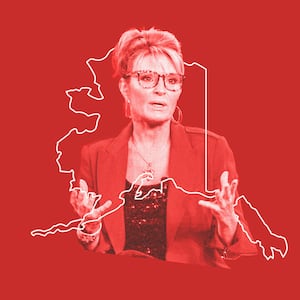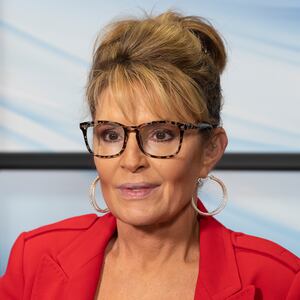Pay Dirt is a weekly foray into the pigpen of political funding. Subscribe here to get it in your inbox every Thursday.
Former Alaska governor and Republican vice presidential nominee Sarah Palin has found a new cause—changing the election law she blames for her 2022 congressional campaign loss. But new details about the fringe conservative group behind that crusade suggest that this battle might very likely meet the same fate.
That group, “Alaskans for Honest Elections,” is dedicated to overturning the practice of ranked-choice voting (RCV). But state filings and a recent campaign finance complaint suggest the ballot committee, which features Palin as its national spokesperson, has generated a blizzard of potential violations, including attempts to skirt disclosure laws, obscure its finances, manufacture tax breaks for contributors, and line the pockets of its own officials.
The Alaska lawyer behind that complaint, Scott Kendall of Cashion Gilmore, told The Daily Beast that the bewildering layers of grift are “almost intoxicating.”
“You turn over one rock and there’s more; turn over another and there’s more there too,” Kendall said. “With the kind of simple-mindedness involved here, as an attorney it’s almost intoxicating.”
While the train of shady wheeling and dealing isn’t exactly new or even all that uncommon in the world of political dark money, in this case, it’s been enabled by a curious mechanism: the creation of a new “church” to fund the whole operation—the absurdly named “Ranked Choice Education Association,” which Kendall makes no bones about describing as “completely fake.”
The man behind these groups is right-wing megachurch minister Dr. Art Mathias, who among other things has openly practiced LGBTQ “conversion therapy” and has claimed that COVID vaccines cause “spontaneous abortions” in 80 percent of pregnant women. Mathias has so far sent at least $90,000 in personal contributions to the ballot committee through the RCEA.
And the cause at the center of this mess—ranked-choice voting—doesn’t detract from the absurdity. If anything, it underscores the bizarre lengths the group has gone in the name of shielding its finances.
Ranked-choice voting (RCV), is a ballot format that gives voters the option of listing their backup choices in addition to their preferred candidate, with those totals added up in subsequent tabulation rounds. The format is thought to help weed out extremist candidates, and it has been championed by die-hard conservatives. (Glenn Youngkin’s gubernatorial primary win in Virginia hinged on the process.) Still, RCV has become a political boogeyman among rightwingers, thanks largely to Palin’s efforts.
Palin lost two RCV contests in 2022: a September special election to temporarily fill the seat of GOP Rep. Don Young, who died earlier that year; then a November election for the permanent slot. They featured two main candidates besides Palin—Democrat Mary Peltola and moderate Republican Nick Begich III. In September, Begich was eliminated after the first round of vote-counting, and when his voters’ second choices were added in, the totals handed Peltola a majority, 51.5 percent to 48.5 percent. This repeated itself in November, when Peltola posted a 10-point margin over Palin. (To make things even weirder, Palin reportedly said she would vote for Peltola, a personal friend.)
The widely understood explanation was that RCV worked: Palin’s MAGA extremism repelled a sizable chunk of GOP voters in the deep-red state, and they chose Peltola over the Wasilla firebrand for their backup picks.
But in the following months, Palin adopted the abolition of ranked-choice voting as a casus belli, and she’s teamed up with Alaskans for Honest Elections to make her case. Palin appeared at the group’s CPAC conference booth this year—which AHE scored two months after its inception—and railed against RCV in her speech at the event.
But as the allegations about AHE continue to stack up, Palin’s own choice appears increasingly misguided.

Sarah Palin attends a campaign event ahead of mid-term elections in Anchorage, Alaska, on October 9, 2022.
Kerry Tasker/ReutersAccording to a complaint filed with Alaska campaign finance regulators in July, the network of groups has committed an array of violations. The complaint—from an organization that supports ranked-choice voting laws, called “Alaskans for Better Elections”—alleges that the network unlawfully used the “church” to get tax breaks on donations, obscure its finances from the public as well as state and federal regulators, and has additionally kicked cash back to its own officials.
The RCEA—which was formed in Washington state, not Alaska—has also leaned on its self-declared status as a “nonprofit religious organization” to avoid registering as a political group with the Alaska Public Offices Commission. That argument hinges on a legal theory favored by anti-government extremists and which legal experts and courts have tersely dismissed, raising questions about whether this “church” should lose its tax status.
Lloyd Mayer, an expert in nonprofit law at Notre Dame University, said that RCEA’s activities could compromise its tax status.
“First, a church is disqualified from federal tax exemption under Internal Revenue Code section 501(c)(3) if lobbying is a substantial part of its activities,” Mayer told The Daily Beast, explaining that the U.S. Treasury Department defines lobbying as including attempts to influence the public regarding a ballot initiative or referendum.
But the RCEA is also nested within two other churches, including Wellspring Ministries, which appears to be subsidizing the whole operation, according to the complaint. (Wellspring also appears to operate an outpost in India.) Coincidentally enough, Wellspring Ministries is also helmed by Mathias.
Kendall, the attorney behind the complaint, described the “cascade” of legal issues and violations his firm uncovered after scratching the surface.
The network’s finances were so opaque, he explained, that their investigation had to reverse-engineer them. “They just weren’t filing the required political disclosures,” he said.
The Daily Beast reached out to Mathias and the Wellspring affiliates but did not receive a response.
AHE was formed on Jan. 8 of this year, state filings show. Those filings also reveal that the group raised around $293,000 in just three weeks, with about 70 percent of that amount purportedly coming as an in-kind donation from another AHE official, Phillip Izon, who claimed to have volunteered $200,000 worth of his time after just two weeks. The RCEA “church” contributed another $76,000 to the group via checks, along with $2,358 in cash—despite state election rules that prohibit cash gifts in excess of $100.
The complaint calls Izon’s $200,000 in-kind claim “absurd” and “laughable,” and alleges that the number was “concocted” in order to mislead the public about the breadth of the group’s support.
“They’re juicing it up to make it look bigger than it is,” Kendall said. “They seem to think that the public perception of their legitimacy will garner more financial support.”
The problem there, he explained, is that it’s illegal to either underreport or overreport your finances.
But that’s just the beginning. Kendall said Izon and his wife are also the group’s sole vendors, and hauled in “every dollar” the network has spent. The group’s total expense reporting doesn’t appear to add up in the filing, either.
AHE reported a little less than $270,000 in expenses in its first weeks. That number includes Izon’s $200,000 in-kind contribution, as well as $67,000 paid to consulting company “Leading Light Advisors”—which business records cited in the complaint tie back to Izon.
Leading Light, it turns out, was also the sole vendor for AHE’s federal super PAC affiliate, “Alaskans for Honest Government.” Federal Election Commission filings show the company received $7,500 total in November, with $5,000 in expenditures supporting Sen. Dan Sullivan (R-AK), whose election at the time was four years away. Only one other federal committee has paid Leading Light—Palin’s 2022 campaign, which shelled out roughly $57,000, mostly for digital ads, along with $2,000 for “photo rights.”
But, according to the complaint, AHE’s money had itself been passed through the Ranked Choice Education Association, the “church” which the complaint claims was established “for the explicit purpose of laundering these funds.”
A state financial disclosure filed in June attributes the majority of donations directly to Mathias, who previously admitted making a $100,000 contribution to the “church” at a February event, the Anchorage Daily News reported. However, filings show that only $90,000 of that made it back to AHE.
Mathias—no stranger to fact-free claims himself—has attempted to justify RCEA’s tax status with a legal interpretation adopted by far-right, anti-government “sovereign citizen” groups.
“It’s a goofy, esoteric constitutional theory, the kind of guys who get a parking ticket and say they can only pay in gold doubloons or whatever,” Kendall said. “But if that theory were correct, then every super PAC would be a church—the Church of Romney, Church of Ted Cruz, Synagogue of Chuck Schumer. It’s not on me to question anyone’s faith, but I don’t see how ballot measures qualify as a religious cause.”
Lloyd Mayer, the Notre Dame law professor, said this specific claim has been deemed “frivolous” in the eyes of the law.
“The argument that RCEA is a tax exempt church under Internal Revenue Code section 508(c)(1)(A) and not section 501(c)(3) is frivolous because it is inconsistent with the plain language of these statutes,” Mayer said, observing that the U.S. Tax Court rejected this argument in 2000, as did the U.S. Court of Appeals)" href="https://urldefense.com/v3/__https://casetext.com/case/branch-ministries-v-rossotti__;!!LsXw!R8mkhgR0-fIpZ0qe2FE2e1jna7fdQ10lvbg-ju9MIqI1IbmokSRcArzEYLIh8VesipyiRQ20RYfYHu06Ay5fPGo2IcM$">U.S. Court of Appeals for the District of Columbia that same year.
In 2020, Mayer noted, the U.S. District Court for the Southern District of California scrapped an attempt to keep a purported church’s finances beyond the reach of the IRS, concluding that those arguments “have no basis in law, and are frivolous.”
The RCEA’s incorporation documents state that its purposes are to “promote Christian doctrines,” establish places of worship, evangelize across the globe, and support missionaries. The group also cites the “preservation of the truth,” and a mission to “train, develop, and support leaders in our community and nation as called for in our beliefs.”
In response to the complaint, Mathias attacked Kendall, a well-known Jewish political attorney in the state, as “Soros-funded” and a “Marxist.”
“He is attacking me, my church, Christians and our initiative to replace his Marxist voting system,” Mathias said, though he has admitted founding the groups and has never explicitly countered Kendall’s legal arguments.
A quick review of Mathias’ own background reveals that this is far from his first extremist rodeo. He’s promoted a number of completely unfounded practices and claims—engaging in LGBTQ “conversion therapy,” declaring he cured his allergies when he “cast out the spirit of fear,” and pushing absurd COVID lies, such as his astounding deduction that COVID vaccines have been proven to “cause spontaneous abortions” and are “killing four out of five babies in the first 20 weeks of gestation.” (Nowhere near true, according to the study that he cited.)
As if things weren’t wild enough, the AHE has chosen for its defense counsel Kevin Clarkson, the disgraced former Alaska attorney general who resigned from office in 2020 amid sexual harassment allegations.
Kendall has taken the attacks in stride.
“They haven’t denied they formed a fake church, they admitted they’ve formed both of these groups as churches, and they haven’t undermined anything factual about the complaint, just broadly characterizing it as misinformation,” he said. “They say it’s none of your business, but to me that’s not a defense.”









